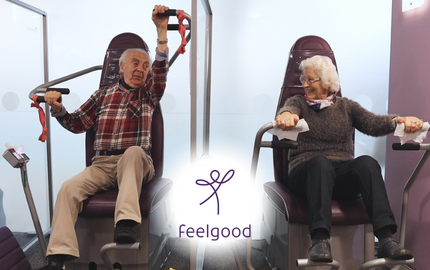Tuesday, 28th March 2023
*See How Fitness and Exercise Could Improve your Quality of Life - Try us for FREE - scroll down and discover how to try our medically approved Feelgood Suite

Active ageing is an approach to ageing that focuses on promoting healthy lifestyles throughout our lives, including our consumption and nutrition patterns, as well as our levels of physical and social activity. It helps reduce the risk of obesity, diabetes, and other non-communicable diseases, which are on the rise globally. However, it's not just a personal choice and responsibility, as it heavily depends on the environment in which people live, work, and socialize.
Physical activity is central to active ageing as it enables older adults to stay healthy and improve their quality of life in later years. According to the World Health Organization, older adults should engage in at least 150 minutes of moderate-intensity aerobic physical activity weekly or at least 75 minutes of vigorous-intensity aerobic physical activity weekly or an equivalent combination of moderate and vigorous-intensity activity. Additionally, muscle-strengthening activities should be done for major muscle groups on 2 or more days a week.
Despite the overwhelming evidence of the health benefits of structured exercise and physical activity in general, many European older adults are inactive and do not meet the minimal national recommendation for physical activity. Across Europe, only 31% of people aged 55 years and over engage in any form of exercise or physical activity on a regular basis. This trend is particularly concerning given the ageing population is an unprecedented challenge for the demographic structure in Europe and beyond. However, it may also represent one of the greatest opportunities for the fitness sector to tap into a relatively unexplored market.
Currently, the market penetration for the European fitness sector targeting older adults is below 10%. This lack of engagement is closely tied to a range of behavioural and socioeconomic factors, but it also indicates that the sector is not currently providing a tailored and sufficiently attractive offer to older adults. Hence, the industry should strive to become a significant game changer, substantially assisting other public and private stakeholders in the global challenge of enhancing health and maintaining independent living in the ageing population.
One such initiative that has successfully engaged older adults in fitness and recreational sports environments is the Active Ageing Communities (AAC) program. AAC was a two-year project (2021-2022) co-funded by the Erasmus+ program of the European Commission and coordinated by EuropeActive. The project aimed to create communities for healthy and active older people in fitness and recreational sports environments. Overall, the project successfully involved 556 older people in 18 fitness centres from six European countries: Czech Republic, Finland, Greece, Ireland, Italy, and Portugal.
The AAC project developed a model for the fitness sector based on international recommendations, scientific evidence, and hands-on experience, to engage older adults in physical activity and long-term sustainable healthy lifestyles, while reducing their levels of social isolation. The program was designed by experts from the University of Southern Denmark as a 24-week multi-layered intervention with several goals, including improving overall health, physiological capacity, and physical function, creating a sense of belonging, making older adults experience physical and psychosocial benefits, and empowering participants to establish a long-term sustainable active lifestyle.
The AAC program consisted of several modules, including education on the biological ageing process and lifestyle habits that can modify ageing trajectories, peer-led social activities, intergenerational events, and behaviour change meetings focused on fostering motivation to promote and maintain physical activity beyond the structured exercise module. Building on WHO's newly updated physical activity guidelines for older adults, this module was designed with biweekly frequency and one hour per session, aimed at providing support and guidance to participants to optimize retention in the program.
In conclusion, active ageing is an essential concept for promoting healthy lifestyles throughout our lives, and physical activity is central to active ageing. While many European older adults are currently inactive, initiatives like the Active Ageing Communities program have shown promise.
The Feelgood Suite at Pendle Leisure Centre is a quiet, welcoming and comfortable exercise room, set away from the main gym floor. The power-assisted machines are perfect for people recovering from illness or with limited mobility but who still want to be able to improve their overall strength, flexibility and wellbeing as well as the chance to meet people and feel part of a wonderful community of locals.
The Feelgood Suite is medically approved - and you can try it for FREE! Call our friendly team on 01282 661165 to arrange a taster session
You can read the full Active Ageing Communities' Executive Summary Here (all citations above can also be found here)